POLYGONS IN THE COORDINATE PLANE
Subscribe to our ▶️ YouTube channel 🔴 for the latest videos, updates, and tips.
A polygon is a closed plane figure formed by three or more line segments that meet only at their endpoints. A vertex is the point where two sides of a polygon meet. The vertices of a polygon can be represented as ordered pairs, and the polygon can then be drawn in the coordinate plane.
Example 1 :
Sheila wants to make a pattern of a tile shape with the points A(3, 5), B(4, 6), C(5, 5) and D(4, 4).
What polygon will she get ?
Solution :
Step 1 :
Let us plot the points A(3, 5), B(4, 6), C(5, 5) and D(4, 4) on the coordinate plane.
Step 2 :
Connect the points in order.
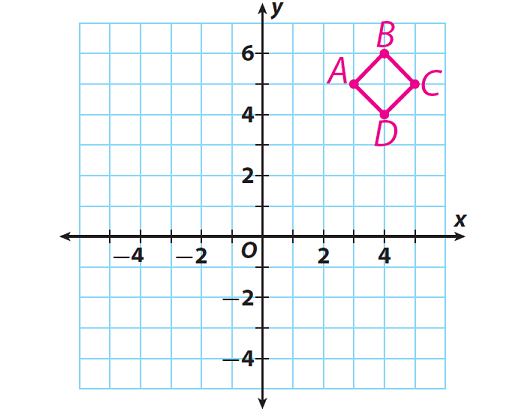
Step 3 :
The polygon formed is a square.
Example 2 :
David wants to make a pattern of a tile shape with the points P(-5, 2), Q(-4, 3), R(0, 3), S(1, 2), T(1, -2), U(0, -3), V(-4, -3) and W(-5, -2).
What polygon will he get ?
Solution :
Step 1 :
Let us plot the points P(-5, 2), Q(-4, 3), R(0, 3), S(1, 2),T(1, -2), U(0, -3), V(-4, -3) and W(-5, -2) on the coordinate plane.
Step 2 :
Connect the points in order.
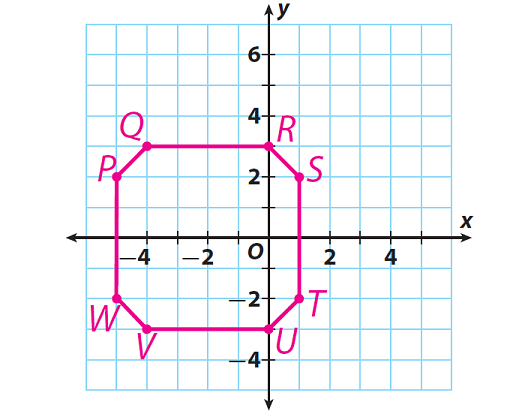
Step 3 :
The polygon formed is an octagon.
Example 3 :
John wants to make a pattern of a tile shape with the points A(-4, 2), B(2, 2), C(2, -2) and D(-4, -2)
What polygon will he get ?
Solution :
Step 1 :
Let us plot the points A(-4, 2), B(2, 2), C(2, -2) and D(-4, -2) on the coordinate plane.
Step 2 :
Connect the points in order.
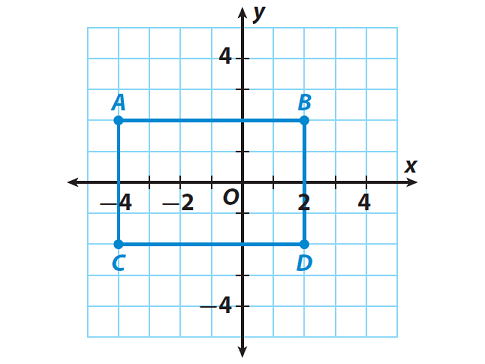
Step 3 :
The polygon formed is a rectangle.
Example 4 :
How is the number of vertices related to the number of sides of the polygon and to the type of polygon ? Give two examples.
Solution :
They are the same.
That is, if a polygon has 3 vertices, it would have 3 sides.
Example :
A polygon with 3 vertices is a triangle and a polygon with 6 vertices is a hexagon.
Example 5 :
In a grid of the exhibits at a zoo, the vertices of the giraffe exhibit are E (0, 90), F (60, 90), G (100, 30), and H (0, 30). The coordinates are measured in feet. What is the area of the giraffe exhibit?
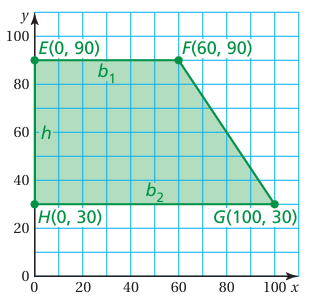
Solution :
Length of parallel sides,
a = 100 - 0 ==> 100 units
b = 60 - 0 ==> 60 units
Height = 90 - 30
= 60 units
The shape created by the polygon is trapezium.
area of the giraffe exhibit = 1/2 x h x (a + b)
= (1/2) x 60 x (100 + 60)
= 30 x 160
= 4800
The area of the giraffe exhibit is 4800 square feet.
Example 6 :
You design a tree house using a coordinate plane. You plot the vertices of the floor at J (2, 1), K (2, 8), L(9, 8), and M (9, 1). The coordinates are measured in feet.
a. What is the shape of the floor?
b. What are the perimeter and the area of the floor?
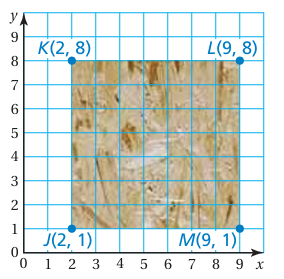
Solution :
Length of the shape = 9 - 2 ==> 7 units
Width of the shape = 8 - 1 ==> 7 units
a) The shape is square,
b) Perimeter of the shape = 4(7)
= 28 units.
Example 7 :
The vertices of a rectangle are (1, 0), (1, a), (5, a), and (5, 0). The vertices of a parallelogram are (1, 0), (2, b), (6, b), and (5, 0).
The value of a is greater than the value of b. Which polygon has a greater area? Explain your reasoning.
Solution :
(1, 0), (1, a), (5, a), and (5, 0)
By connecting these points, we will get a rectangle.
Di
Length of the rectangle = 5 - 1 ==> 4
Width of the rectangle = a - 0 ==> a
Area of rectangle = 4a square units
(1, 0), (2, b), (6, b), and (5, 0)
By connecting these points, we will get a parallelogram.
Dimension of parallelogram :
Distance between (1, 0) and (6, b)
Base = 6 - 1
= 5
height = b - 0
= b
Area of parallelogram = 5b
Since a is greater than b, we can conclude that the rectangle has a greater area than the parallelogram. Therefore, the rectangle is the polygon with a greater area.
Example 8 :
The polygon shown is a regular polygon since all sides have equal length and all angles have equal measure.
a. The polygon is a regular
b. What is the perimeter of the polygon?
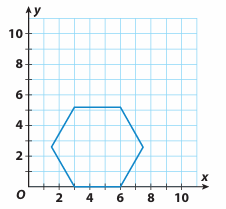
Solution :
a)
Side length of the polygon = 6 - 3
= 3 units
The given shape is hexagon.
b)
Perimeter of hexagon = 6(3)
= 18 units.
Example 9 :
The vertices of a rectangle are F (1, 6), G (7, 6), H (7, 2), and J (1, 2). Draw the rectangle in a coordinate plane and find its perimeter.
Solution :
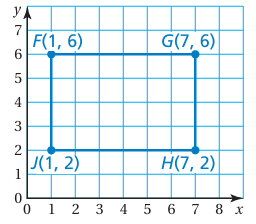
Perimeter of rectangle = 2(length + width)
Length = 7 - 1
= 6 units
Width = 6 - 2
= 4 units
Perimeter = 2(6 + 4)
= 2(10)
= 20 units
Subscribe to our ▶️ YouTube channel 🔴 for the latest videos, updates, and tips.
Kindly mail your feedback to v4formath@gmail.com
We always appreciate your feedback.
About Us | Contact Us | Privacy Policy
©All rights reserved. onlinemath4all.com

Recent Articles
-
SAT Math Problems on Exponents and Radicals
Feb 21, 26 08:28 PM
SAT Math Problems on Exponents and Radicals -
SAT Math Problems on Angles
Feb 21, 26 08:20 PM
SAT Math Problems on Angles -
Digital SAT Math Problems and Solutions (Part - 9)
Feb 21, 26 10:41 AM
Digital SAT Math Problems and Solutions (Part - 9)

